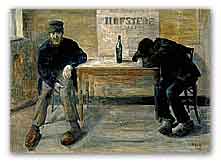|
One spouse experiencing the alcohol use disorder
strongly influences the otherís risk to have the
same problem.
Spouses with uncontrolled drinking problems have a
rapid big influence on their partner.

James Ensor - The Drunkards
Population-wide Swedish registries were used to
identify individuals born in Sweden between 1960 and
1990 who were married before the end of study
follow-up on December 31, 2013.
The study included 8562 marital pairs with no
history of alcohol use disorder registration prior
to their first marriage and an alcohol use disorder
registration in 1 spouse during marriage and 4891
individuals with multiple marriages whose first
spouse had no alcohol use disorder registration and
second spouse did or vice versa.
Final statistical analyses were conducted from
August 15 to September 1, 2017.
After a husband was first diagnosed with alcohol use
disorder, his wifeís risk of a similar diagnosis
immediately rose 14-fold compared to women whose
husbands did not have that diagnosis, researchers
found.
But then her risk fell during the next couple of
years to about four-fold.
Similarly, husbandsí risk shot up nine-fold after a
wifeís diagnosis, then declined to about three-fold.
Itís long been known that spouses tend to resemble
each other in alcohol consumption and abuse, but it
hasnít been clear whether thatís because people with
similar habits seek each other out, or because
partners exert a strong influence on one another.
When the researchers looked at whether people had
alcohol use disorders before their first marriage,
and what happened in second and third marriages,
they found that one spouse experiencing the disorder
strongly influences the otherís current risk.
However, after a first marriage to a spouse without
an alcohol use disorder, individuals who married a
partner with the disorder raised their own risk
seven- to nine-fold.
A similar, but weaker risk increase was seen in
third marriages with these combinations.
Past research among twins and children of alcoholics
has shown that genetic factors do influence
alcoholism, they add.
The current study indicates, though, that alcohol
use disorders shared by married couples are not just
a result of people seeking out mates who are similar
to them in this regard, the authors write.
For more information
JAMA Psychiatry
The Origin of Spousal Resemblance for Alcohol Use
Disorder
Link...
MDN |